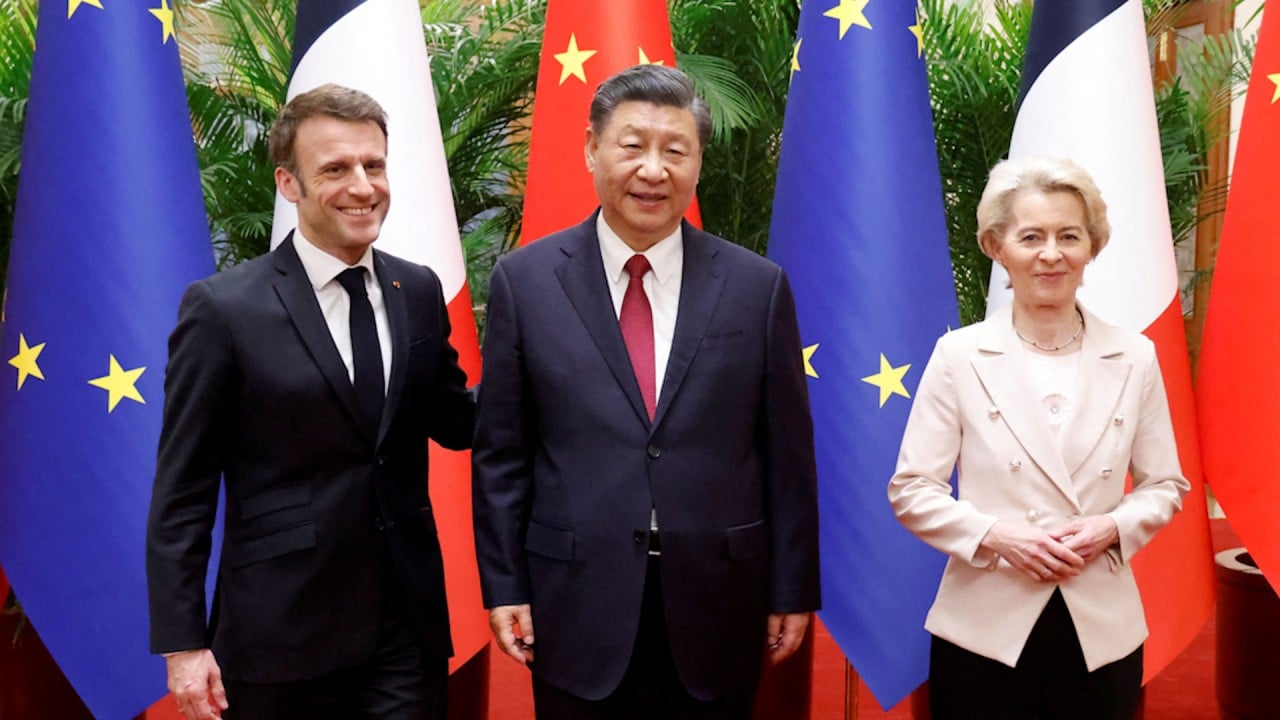
France’s Macron ends trip to China with pact to bolster business, military ties
- But the joint statement with Xi Jinping does not include a commitment from Beijing to use its influence to end Russia’s war on Ukraine, a key Macron request
- Document reflects Macron’s desire to secure more of the giant market for French firms at a time when others in the West want to reduce their dependence on China
France will work with China on thorny issues ranging from 5G technology to military engagement after President Emmanuel Macron signed a sweeping 51-point joint declaration on his last day in the country.
The statement, published as Macron was touring sites in Guangdong province with Chinese leader Xi Jinping, capped off a trip on which he sought to expand economic ties with China, even as geopolitical eddies continued to swirl.
It did not contain a concrete commitment from Beijing to use its influence over Russia to end its 14-month war against Ukraine – a key Macron request – even as it pledged to “support all efforts to restore peace in Ukraine”.
Instead, the statement reiterated Xi’s oft-stated opposition to nuclear war. The two sides said they opposed “armed attacks on nuclear power plants”, mentioning the Zaporizhzhia facility in Ukraine that has been occupied by Russian forces.
On the military front, the pair agreed to “deepen exchanges” between the Chinese People’s Liberation Army’s Southern Theatre, which has jurisdiction over the South China Sea, and the French units in the Asia-Pacific.
At a time when Chinese technology companies are being banned from the roll-out of 5G infrastructure across the West, France agreed to continue “the fair and non-discriminatory treatment of licence applications from Chinese companies”.
However, that the licences can be considered in line with the “national security of both countries” suggests that this will not interfere with a de facto French government move to push Huawei Technologies out of its network by 2028.
Nonetheless, the document reflected Macron’s desire to secure more of the giant Chinese market for France’s firms at a time when voices elsewhere in the European Union and particularly in the United States are calling for more mindful trading ties that roll back dependencies on China.
Zelensky accuses Russia of holding Zaporizhzhia nuclear plant ‘hostage’
This sentiment dominated a three-day state visit that was filled with pomp and pageantry.
Macron rounded off his trip by having tea with the Chinese leader in a garden in Guangzhou, the capital city of the southern exporting powerhouse that was once governed by Xi’s father.
A clip posted by state media showed the two watching a musician play an ancient tune on a guqin, a seven-string Chinese instrument. Macron was pictured asking his host about the music, who explained that it was a thousand-year old piece about soul mates.
This bonhomie and the lavish welcome afforded Macron was in stark contrast to the icy atmosphere sensed during fellow traveller Ursula von der Leyen’s 48 hours in Beijing. The European Commission chief accompanied Macron at his invitation, but had a very different sort of message to deliver.
While Macron flew on his own Airbus A330 with a group of media, business and cultural figures, von der Leyen took a comparably spartan 14-hour commercial flight to the capital, complete with a four-hour layover in the Middle East.
While Macron signed a series of deals for French firms in sectors including civilian nuclear energy, wind power, pork and cosmetics, von der Leyen told Xi that the EU wanted to “de-risk” its trade relations with China, relaying in person a tough-talking economic message she has floated in Europe over recent weeks.
Macron and Xi’s Guangzhou rendezvous a sign of China’s enthusiasm, analysts say
In Brussels, some complained that von der Leyen was not shown the same respect as Macron by her hosts – despite it being clear that she was not in China on a state visit.
“The good-bad cop approach was always going to lead to different outcomes, but I guess Xi treated von der Leyen in a way that made it a bit humiliating,” said one French official, speaking on condition of anonymity.
Macron is “on board” with von der Leyen’s message about de-risking, “but he struggles with staying on message and not making it about him, sadly,” the official added.

Others suggested that Macron’s enthusiastic pro-business approach had sent “unhelpful ambiguity” to the world about what EU policy towards China is supposed to be.
“The EU has never been that united [on China],” said Antoine Bondaz, a China specialist at La Fondation pour la Recherche Stratégique, a French think tank.
“Once again, we should not confuse privileged access to Xi Jinping with special influence. It only gives us the opportunity and responsibility to convey strong and clear messages,” he added.
China, France make peace pledge on Ukraine as Macron caps trip with Xi meeting
Andrew Small, a senior transatlantic fellow at the German Marshall Fund of the United States, suggested that von der Leyen would probably view her visit as a success, despite the frosty reception.
“She believed that there was real value in going along and conveying much of the same message in person to Xi that she did during her speech, and that Macron’s line was not in some sense the ‘real’ European position,” Small said, referring to a keynote address on China von der Leyen gave in Brussels a week ago.
“Of course this was not going to land well for Xi, and he was not going to say enthusiastic things in their bilateral meeting – what on earth else would we have expected?”


